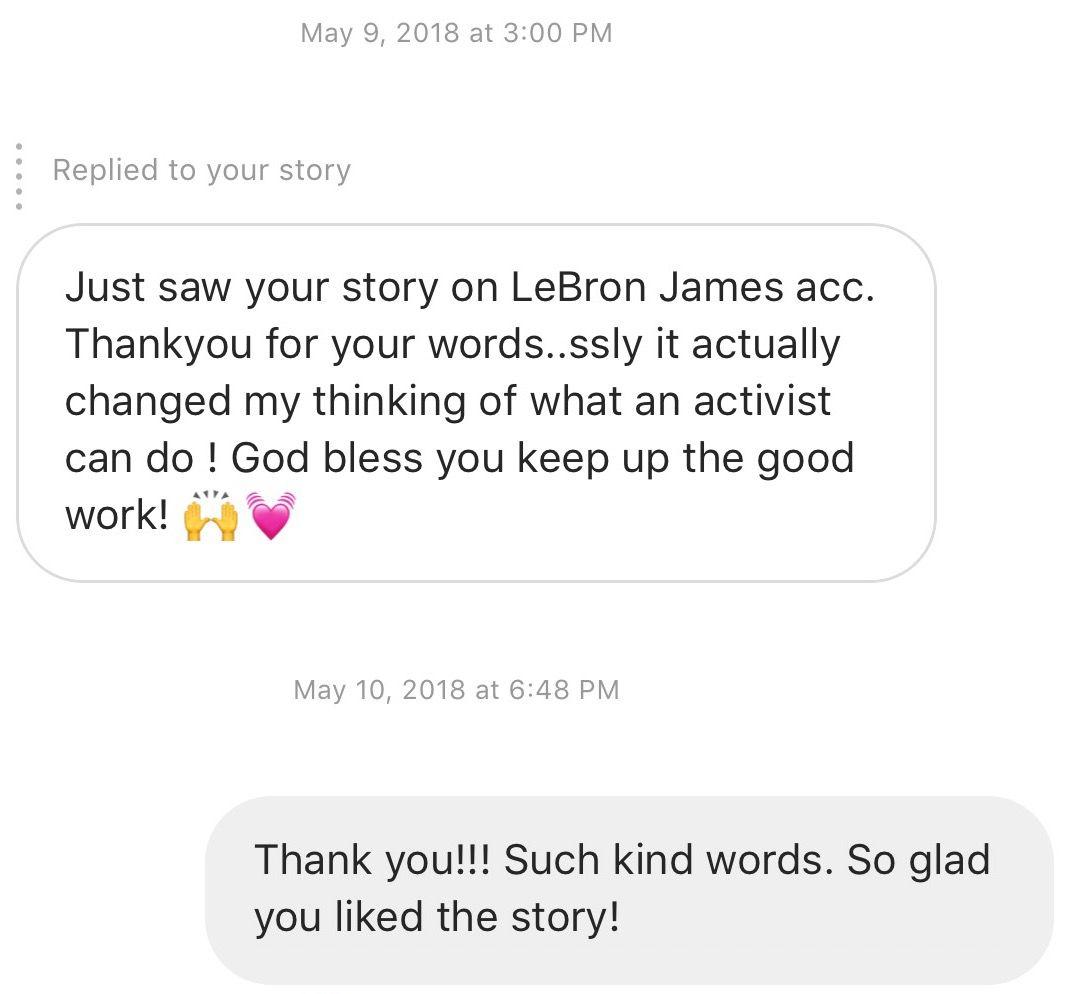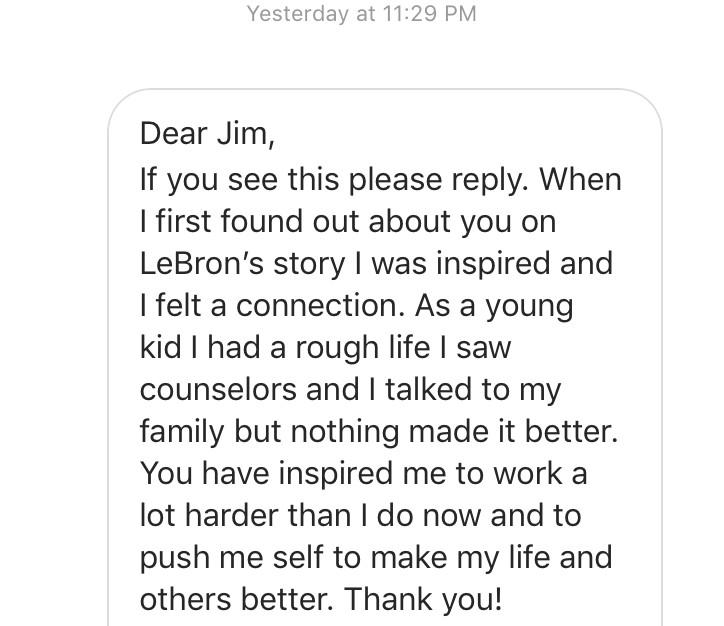To put LeBron James’s 37.5 million Instagram followers in perspective, Game 1 of the Eastern Conference finals drew 7.2 million viewers on ABC. James is the fifth-most-followed athlete on Instagram after Ronaldo, Messi, Neymar, and David Beckham. His following is double the population of every NBA playoff team’s home city combined.
Yet every postseason for the past seven years, LeBron has gone dark on social media to eliminate distractions in an annual tradition that he calls “Zero-Dark Thirty-23 Mode.” This year, James has tweaked that strategy (but, unfortunately, not the name). He’s stayed silent on social media himself, but the most influential athlete in America has handed over his platform to the next generation of social influencers.
Nearly every day for the past month, James has posted a video to his Instagram Story of a different teenager or young adult with experience in business, social justice, or philanthropy, letting them share their passions, work, and wisdom. The Instagram Story expires after 24 hours, but James has saved them under Instagram’s new Highlights feature pinned to his profile.
The first video posted to the campaign came from Kheris Rogers, an 11-year-old who started an anti-bullying-focused clothing company called “Flexin’ in my Complexion” after she was bullied because of her skin color.
“So many people around the world — boys, girls, women, even men that were being bullied — said I’m inspiring to them,” Rogers told The Ringer. “And I said, ‘Oh my god, I’m inspiring these people.’ I never thought my story would go so far.”
Other videos have included messages about nutritious food, community-police relations, literacy, rising sea levels, plastic pollution, homelessness, and even the epidemic of bees dying at an alarming rate. LeBron’s involvement does not magically solve any of these issues, but he’s given us a window into what “starting a dialogue” means in 2018.
“One day I got a DM notification: ‘@kingjames mentioned you in his Story,’ and I almost fainted,” said Jen Winston, who runs the feminist Instagram account Girl Power Supply.
Winston, like the other people featured on James’s Story, submitted videos to be posted but was unsure whether they would ever see the light of day. All of the people featured have a similar story about how they made it onto James’s Instagram feed. They received a cryptic email around the beginning of April saying a well-known athlete with more than 30 million Instagram followers wanted to give them a platform to highlight their work. Many deduced it was James by process of elimination.
Winston, who at 29 is one of the handful of speakers selected old enough to legally drink, spent a full day filming dozens of takes to craft a message that would resonate with 37.5 million people. She made her message about how everyone can work to dismantle oppressive forces affecting others.
“Most of LeBron’s audience is men who like basketball,” Winston said. “So when I’m out there talking about feminism, I knew I had to do it in a specific angle, so I said you can be a man and also fight to dismantle sexism because that’s who women really need as allies.”
Unsurprisingly, Winston had men crawling in the comments section of her page mocking feminism.
“I got a lot of trolls as well,” Winston said. “And this is something I’m used to in the feminist space because whatever your politics are, the word ‘feminism’ has connotations. People think it’s about hating men. … You’re reaching a huge audience that are not all going to want to hear what you have to say.”
That type of negative reaction is not surprising to anyone familiar with the workings of the internet, but negativity was actually rare for most of the people featured on James’s story. The 24 hours of fame rained a DM flood of biblical proportions, and to the surprise of many who know how the internet works, people said nice, encouraging, and thankful things. Winston shared one of the direct messages she received after her story went live on James’s account.

“I think a lot of people, especially people who do this kind of work — we do activist work, we do social justice work — tend to get negative feedback,” said Seun Babalola, a rising senior at Penn State featured on LeBron’s Story. “You’re in an alt-right kind of age where everybody is really alt-everything in what they want to say. So that was surprising when everything was generally positive.”
Delaney Reynolds, an 18-year-old rising sophomore at the University of Miami (and a Heat fan) who has already written three books and is in the middle of writing a fourth, spoke about the Sink or Swim Project to combat climate-change-induced rising sea levels in South Florida.
One response she received sticks out: an 11-year-old boy in Australia was concerned about how the sustainable energy projects she advocated for would affect Australian coal workers.
“I explained people would have to transition from the coal industry to the sustainable energy industry,” Reynolds said. “There’s a ton of jobs to be had there, whether it’s creating the different devices, whether it’s solar panels or windmills, installing them, maintaining them, different jobs I think people will have to transition into. I explained we’ve done it before when we went from horse-drawn carriages to the auto industry. … That’s the coolest message I received because he’s so far away, but the fact that I had an impact on him and he was curious enough to reach out.”
Jim St. Germain is the author of Stone of Hope, a memoir about his struggles growing up as a Haitian immigrant navigating poverty in Brooklyn. St. Germain founded Preparing Leaders of Tomorrow (PLOT) to help at-risk youth, and serves as a mentor for young men in the same Brooklyn neighborhood where he grew up. He’s heard from reporters as far away as Bahrain, Italy, and Morocco, and had people asking to purchase his book in countries where it’s not even being sold. What moved him most was the dozens of young adults reaching out to thank him for sharing his message that every kid deserves the opportunity to achieve their best.
St. Germain shared a DM he received that particularly resonated with him.

“I’ve been fortunate” St. Germain said, who was appointed by President Obama to his Task Force on 21st-Century Policing. “I’ve done a lot of big things. But this has been the most immediate impact.”
All of the encouragement cuts both ways. Chental-Song Bembry is the author of a children’s book series, titled The Honey Bunch Kids, an an advocate for children’s literacy, and she said she’s been overwhelmed with support on social media.
“I loved reading, writing, and loved cartoons, but I didn’t see many cartoons in books or on TV who looked like me,” Bembry said. “So my mom inspired me to create my own characters.” Three years later, at 13 years old, Bembry self-published her first book. Now 21 and fresh off her graduation from Hampton University, Bembry was moved by seeing eight years of work recognized.
“It’s very easy to get discouraged as a young writer, but when you see so many people you don’t know with such overwhelming support, it’s very motivating, and I’m very thankful for all the positive feedback I’ve gotten,” Bembry said.
LeBron’s platform not only distributes these messages to a massive audience, but in the eyes of young adults across America who idolize him, his endorsement legitimizes the message and invites young people to join the conversation.
“[LeBron] is my inspiration in basketball, but also added to him being a great basketball player, he’s a businessman like me,” said Jahkil Jackson, the 10-year-old behind Project I Am, an organization that distributes “blessing bags” with basic toiletries and everyday needs for the homeless around Chicago. “And just like a businessman I want to own my own NBA team when I grow up.”
Handing over a platform dominated by young people to their peers creates an eye-to-eye conversation difficult to replicate elsewhere at scale.
“For a long time dialogues were held just amongst adults, and now young people have such an opportunity to be a part of it. And it is so helpful when adults who are very immersed in these conversations bring us in,” said Haile Thomas, a health activist, speaker, and CEO of the Happy Org who appeared on LeBron’s Story. “So I think 2018 is definitely the year of changing who is a part of these conversations and what conversations are happening and making all opinions matter and all opinions valid.”
The issues being discussed can feel too big to tackle — global warming, racism, misogyny — but 14-year-old Cory Nieves, the second person featured on LeBron’s Story, shared his story of building a business in a single-parent household. He said his goal was simple.
“I’m happy that message got out to millions of kids who don’t have a dad and are sad and are lonely and don’t know what to do and they’re crying every day,” Cory said. “If even one kid saw that message, I’m happy. Now he knows he’s not alone, he’s not the only kid out there, and he has hope and he has other people who care for him.”
